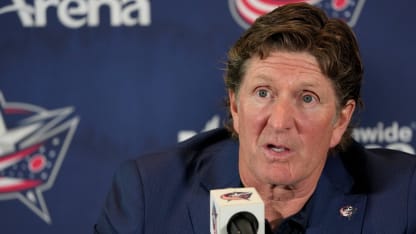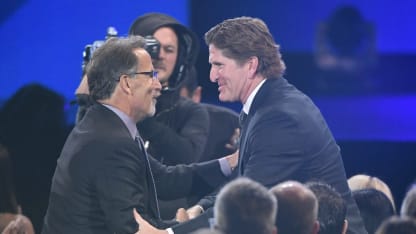Mike Babcock, one of the most accomplished coaches in hockey history, is taking over the Columbus Blue Jackets this season in his first NHL job since the Toronto Maple Leafs fired him Nov. 20, 2019.
NHL.com visited Babcock at his home in suburban Detroit to talk about why he decided to coach in Columbus, how he plans to communicate better with players this time, and what he thinks of the Blue Jackets.
This is the second story in a three-part series. (Part 1 | Part 3)
BRIGHTON, Mich. -- Mike Babcock met with a player while volunteering as coach at the University of Saskatchewan in 2021-22. His son, Michael, was one of his assistants.
“I think the meeting’s spectacular,” Babcock says. “The next day, my son comes up to me and says, ‘The player says to me you’re all over him.’ I said, ‘I thought we had a great meeting.’”
Babcock has shared that story multiple times since becoming coach of the Columbus Blue Jackets on July 1. He recognizes that there has been a disconnect with players in the past, that he has been unaware of it in the moment and that he needs to take steps to fix it in the future.
His stint at Saskatchewan has inspired him to make a communications plan and a mental health plan for each player in Columbus, and he has asked everyone to let him know if something is wrong.
What is a communications plan? What does it look like?
Babcock used to make a contract with each player entering the season. He’d ask for three areas in which the player felt he needed to improve, and they’d write them on a card. Often, they were the same areas he had in mind. Sometimes, he’d make a change or an addition. They’d refer to it in meetings during the season to track progress. It was all about on-ice development.
Now he and the players will focus on off-the-ice development too.
“We’re also going to have a communication contract, because I learned that I was brutal at it, and I thought I was good at it,” Babcock says.
Babcock says he’s receiving help from an expert at Ohio State, and he’s talking to each player about what’s best for him.
“I don’t know if it’s a contract,” Babcock says. “It’s, ‘This is what I’m thinking. This is what you’re thinking. Here’s how we’re going to communicate best.’"
Babcock says one player might tell him, “'Babs,' when you get [ticked] off on the bench at me, it does me no good. If you want to talk to me, just lean over in my ear,” but another player might say, “I actually need a tightening every once in a while, Babs. Make sure you got me.”
“I want them to tell me how they want to be talked to, how they want to meet,” Babcock says. “Some guys don’t ever want to come into your office. Are you getting them a coffee? Are you getting them under the stands on the way out? I used to skate around with guys before (practice), but now if you skate around with a guy, there’s an article (written about it), so you can’t do that.”
Here’s what he wants the players to know:
“I want to treat you with the utmost respect,” he says as if speaking to a player. “My intention is going to be kind. But I want you to maximize what the good Lord gave you. I want you to push. I promise you this year in Columbus we’re going to work, I promise you, so you have to buy into that.”




















